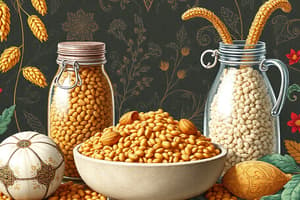Podcast
Questions and Answers
What types of foods should athletes focus on eating for a balanced diet?
What types of foods should athletes focus on eating for a balanced diet?
- High-fat dairy products and fried foods
- Mainly sweet snacks and processed meats
- Canned foods and sugary beverages
- Various kinds of foods including vegetables and grains (correct)
When is the appropriate time for athletes to eat before a competition?
When is the appropriate time for athletes to eat before a competition?
- 1 hour before the event
- Immediately before the event starts
- The night before the event
- 2 ½ to 4 hours before competing (correct)
Which meal preparation methods are recommended for a balanced diet?
Which meal preparation methods are recommended for a balanced diet?
- Boiling and frying
- Raw foods only
- Microwaving and deep frying
- Grilling, steaming, or baking (correct)
What types of snacks should be avoided for a healthy diet?
What types of snacks should be avoided for a healthy diet?
What should athletes consume during competitions lasting more than one hour?
What should athletes consume during competitions lasting more than one hour?
After how long of continuous activity should athletes start consuming solid food?
After how long of continuous activity should athletes start consuming solid food?
How should protein and fats be managed in pre-competition meals?
How should protein and fats be managed in pre-competition meals?
Which of the following is an important guideline for hydration during competition?
Which of the following is an important guideline for hydration during competition?
What percentage of complex carbohydrates should meals contain throughout the day to assist in energy replenishment?
What percentage of complex carbohydrates should meals contain throughout the day to assist in energy replenishment?
Which approach allows athletes to participate in decision-making?
Which approach allows athletes to participate in decision-making?
What is a characteristic of the autocratic coaching style?
What is a characteristic of the autocratic coaching style?
What do codes of ethics in coaching reflect besides legal concerns?
What do codes of ethics in coaching reflect besides legal concerns?
What is one key factor needed to develop a successful coaching philosophy?
What is one key factor needed to develop a successful coaching philosophy?
Which of the following is NOT a feature of a democratic coaching style?
Which of the following is NOT a feature of a democratic coaching style?
How can a coach better tailor training to an athlete's needs?
How can a coach better tailor training to an athlete's needs?
What does a lack of personal empathy in coaching negatively affect?
What does a lack of personal empathy in coaching negatively affect?
Flashcards are hidden until you start studying
Study Notes
Balanced Diet Guidelines
- Consume a variety of foods including vegetables, fruits, fish, meats, dairy, and grains.
- Prefer fresh foods over canned, frozen, or pre-prepared options.
- Include a high proportion of complex carbohydrates in meals.
- Opt for grilling, steaming, or baking methods instead of boiling or frying.
- Limit intake of fatty meals and sweet or salty snacks.
- Ensure adequate fiber intake through whole grain products and opt for brown rice.
- Use herbs and spices for flavor instead of salt.
- Drink water and fruit juice regularly in small amounts.
Pre-Competition Nutrients
- High energy levels are crucial before training and competition.
- Ideal pre-competition meal should be small (under 900 calories) and easily digestible.
- Consume the meal 2.5 to 4 hours prior to the event.
- Limit protein and fat intake as they digest slowly.
- Avoid gas-producing foods.
- Maintain hydration by drinking small amounts of water frequently.
During Competition Nutrients
- Nutrients are generally unnecessary for events lasting less than one hour.
- Events exceeding one hour may require carbohydrate drinks or fruit for energy.
- For activities over two hours, small amounts of easily digestible complex carbohydrates (e.g., bananas, peanut butter sandwiches) can be consumed during breaks.
- Ensure athletes do not fast during extended events (6-8 hours).
Post-Competition Nutrients
- To replenish energy, consume readily available carbohydrates (e.g., fruits, carbohydrate drinks, granola bars) immediately after exercise.
- Subsequent meals should focus on 65% complex carbohydrates for effective energy replenishment.
Coaching Styles: Autocratic vs. Democratic
- Autocratic Coaching:
- Coach makes all decisions; directive and dominating approach.
- Unidirectional exchange of knowledge.
- Coach sets rules, rewards, and standards with little personal empathy.
- Democratic Coaching:
- Athletes participate in decision-making.
- Interactive communication with athletes' values included in goal-setting and evaluation.
- Fosters flexibility, empathy, and strong personal relationships.
Coaching and Ethics
- Established rules provide a framework for coach behavior, influencing coaching methodologies and ethical considerations.
- Ethical standards reflect social norms, legal obligations, and human rights.
- Coaches and athletes must understand the evolving nature of ethical codes.
Conclusion: Coaching Philosophy
- Developing a successful coaching philosophy requires major objectives and personal beliefs.
- Coaches should be aware of their strengths and weaknesses, and understand their coaching context deeply.
- Personalizing training to meet individual athlete needs enhances effectiveness.
- Every coach possess a philosophy, whether instinctive or formally articulated, aimed at helping athletes achieve their aspirations.
Studying That Suits You
Use AI to generate personalized quizzes and flashcards to suit your learning preferences.




